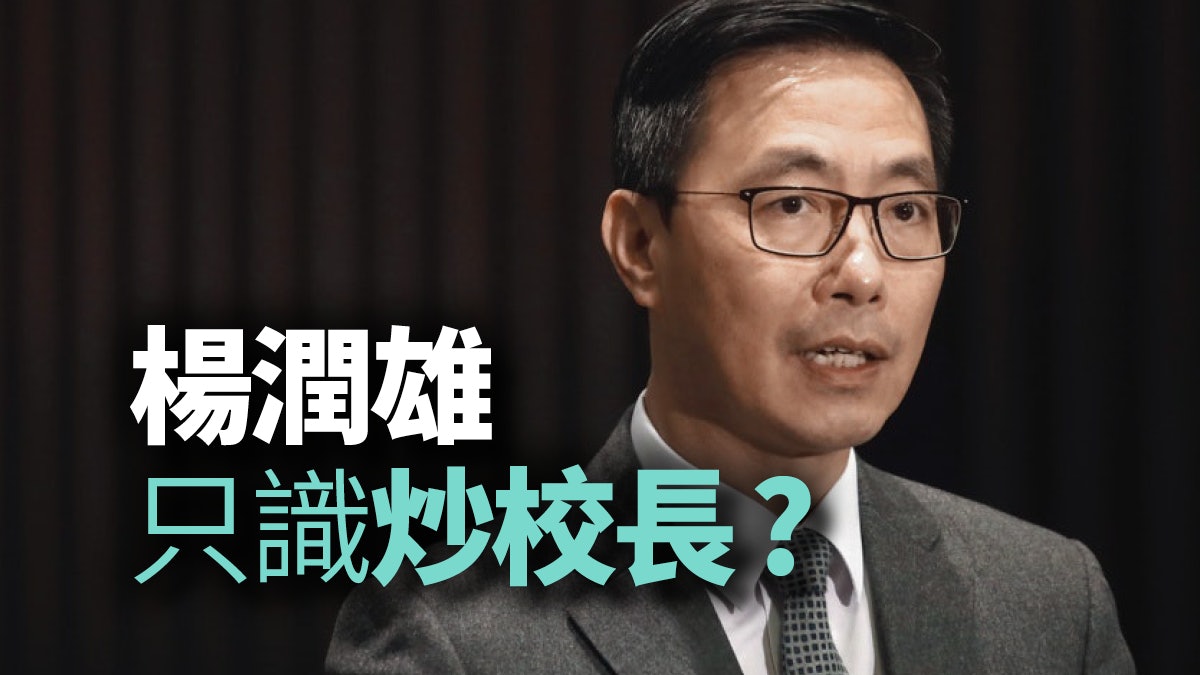01 perspective
Written by: Comment Editor
2019-12-30 17:40
Last updated: 2019-12-30 17:58In an interview with the mainland media, the director of the Education Bureau, Yang Runxiong, stated that if the school did not cooperate with the investigation and punished teachers who misbehaved in connection with anti-revision legislation, the principal may be disqualified. His remarks have caused repercussions in the education sector in Hong Kong. The matter is significant. Why does the Secretary speak to the Mainland media instead of communicating directly with the local education sector?
Anti-revision demonstrations have affected the education sector and schools. As early as September, there has been controversy over whether students can strike on campus. Before the start of school, the Education Bureau has met with school sponsoring groups, school councils, and principals' meetings, and agreed to deal with school-based schools under the principle of opposing strikes. As of October, society is concerned about bullying on campus. Secretary Yang Runxiong also met with the Education Federation, the Education Council, and the Aided Primary School Principals Meeting to reiterate the Bureau's "zero tolerance" attitude and issue guidelines to support schools to follow up cases seriously.
However, it appeared that the Education Bureau and the education community had started to distance themselves. In mid-November, the "three major strikes" initiated by the demonstrators paralyzed the traffic. The education community hoped that the bureau could announce the suspension of the class, but Chief Executive Lin Zheng Yue'e initially refused on the grounds that he could not "middle." Deng Zhenqiang, the chairperson of the Principals 'Association of High Schools, said at the time that the education interface was "confused" by society and suggested that the government suspend classes because students' safety was paramount. It was only after the Bureau announced the suspension of classes that it responded to the needs of the education sector.
Yang Runxiong must communicate with the education community
Until recently, some teachers have been complained about anti-revision practices. According to the Bureau ’s recent disclosure, 13 religious teacher professional conduct complaints have been completed, five condemnation letters, one warning letter and seven advisory letters have been issued, two of whom have been suspended. In a recent interview with the mainland media, the director said that if the school did not cooperate with the investigation and shield the teachers who were suspected of improper conduct, the bureau could disqualify the principal and cause a reaction in the education sector. For example, Dade, Chairman of the Federation of Wanchai District Principals, said that Yang Runxiong's comments made him feel a lot of pressure.
Since Hong Kong education is based on the principle of school-based processing, the Bureau has already had to communicate more with the school represented by the principal and express concern. What's more, the anti-revision example is very serious. It is a serious matter whether teachers can uphold professional ethics. If the Education Bureau only talks to the media and does not communicate well with the education community, it will be easy for them to become clumsy. Even though Yang Runxiong hoped that the school's original intention to seriously follow up the complaint investigation was good, he stated to the inappropriate objects rather than communicating with relevant stakeholders, reflecting his lack of political and business wisdom.
Anti-revision demonstrations affected the educational level. Many middle school students were trapped on PolyU campus. Many principals took a boat to PolyU. (Profile picture / Photo by Chen Xintong)
Narration of teachers under school-based management
Going back to the issue itself, we need to clarify the current teacher complaints mechanism and the powers of principals. First, in the school-based management system, the power to hire and fire teachers is in the IMC. If parents or other people are dissatisfied with the teacher, they can lodge a complaint with the school board and let them handle it. If teachers have a problem with ethics, they are suspected of violating the Hong Kong Code of Education Professionals. The public also lodged a complaint with the Educators' Professional Conduct Council. After investigation, they recommended that the Permanent Secretary for Education take action, such as issuing a warning letter. But whether to suspend or dismiss, the power is still in the school council.
One of the ex officio members of the school council is the principal, who should also be the person who knows the teachers and the school best. Therefore, it is reasonable for the community to pay attention to whether the principal is fair and fair in handling teachers' complaints. However, the principal is only one of the members of the school management committee, and the chairman of the school management committee is the school supervisor instead of the school principal. If the school management committee considers that the teacher's complaint about improper words and deeds is not valid, it is inevitable to blame the school principal alone. If this happens, the community should ask why the school council, including the dean, faculty, alumni and independent persons, makes such judgments.
Qualifications for teachers and principals
As for Yang Runxiong, if the principal supports the teacher in question and does not cooperate with the investigation, "if we feel that a principal is no longer competent, we can cancel his principal qualification", or even "it is not appropriate to be a teacher". Teacher qualifications. Institutionally, this statement is not wrong. At present, the qualifications of teachers and principals are approved by the Education Bureau; after a teacher has five years of teaching experience and completes a designated course, he can apply to the Education Bureau to become the principal. According to the Education Regulations, the Permanent Secretary of the Education Bureau basically has a great deal of decision power and cancels the qualifications of teachers and principals.
According to Article 46 of the Education Regulations, the disqualification of a teacher is exempted: the Permanent Secretary does not consider it suitable and appropriate, the teacher has been convicted of a crime punishable by imprisonment, and his health status is unsuitable.
According to Article 56 of the Education Regulations, the disqualification of the principal is exempted: the Permanent Secretary does not consider it suitable and appropriate, the principal has not satisfactorily performed the duties of the principal, and the principal has ceased to perform the duties of the principal.
As Huang Junyu, president of the Education Federation, pointed out, Yang Runxiong's statement is not new and the government has the right to cancel the principal's qualification. However, this power is not only the dismissal of teachers or principals, but also the disqualification of their practice, which is even more serious. Furthermore, "suitable and appropriate" is a subjective description, or may make teachers and principals believe that there are no clear guidelines. In addition, neither clause of the Education Regulations mentions the appeal mechanism. Once the bureau cancels its qualifications, the parties have to review their decision or it is difficult. Looking at these three points, the Bureau must exercise caution. The principal, Dade Zheng, described that "I don't know the rule of the Education Bureau", which will inevitably cause the academic circles to worry that in the future, it is not unreasonable to only say that it conforms to the Bureau's position.
Communication mechanism and fairness guidelines
For teachers with improper conduct, as reflected in the Xingde School incident, the school board sometimes shields the parties, so the Education Bureau needs to follow up on the board's decision. However, if the standards of the school and the bureau are different, the bureau should understand directly with the school, such as the principal or the school board, and can provide more specific guidelines. Follow-up should establish a mechanism and a flat standard, so that schools have clear guidelines for reference, such as how teachers 'comments are counted as inappropriate, the criteria for commenting on politics, and teachers' private speeches on social platforms. This can prevent the school from being subject to unnecessary pressure and even self-censorship or chilling effects.
As the director of the Education Bureau, Yang Runxiong was also under pressure. Former chief executive Liang Zhenying even publicly criticized him for "palliative rape" in September. However, facing the problem requires political wisdom. The education major under the storm of revision is a challenge; school management under the school-based principle is another challenge. In addition to addressing the media, the Secretary should also fundamentally manage the issue and strengthen communication with the school, so as to truly face and overcome this dual challenge.
01 depth
Education Bureau Yang Runxiong's Counter-Amendment Demonstration 01 Viewpoint School-based Management Corporation School Board









